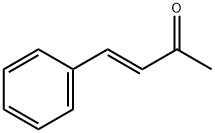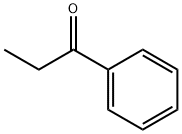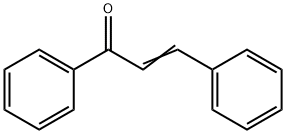trans-4-Phenyl-3-buten-2-one
- CAS NO.:1896-62-4
- Empirical Formula: C10H10O
- Molecular Weight: 146.19
- MDL number: MFCD00008779
- EINECS: 217-587-6
- SAFETY DATA SHEET (SDS)
- Update Date: 2024-12-04 20:40:58

What is trans-4-Phenyl-3-buten-2-one?
Chemical properties
light yellow low melting crystalline mass or
The Uses of trans-4-Phenyl-3-buten-2-one
trans-4-Phenyl-3-buten-2-one is used in various synthetic preparations.
What are the applications of Application
trans-4-Phenyl-3-buten-2-one is used for various synthetic preparations
Definition
ChEBI: The trans-isomer of benzylideneacetone. It acts as an inhibitor of the enzyme phospholipase A2 (EC 3.1.1.4) of insects like diamond back moth.
General Description
trans-4-Phenyl-3-buten-2-one forms trans-4-(4-hydroxyphenyl)-3-buten-2-one (4-OH-PBO) as a metabolite when incubated with liver microsomes of untreated rats in the presence of NADPH.
Safety Profile
Mutation data reported. Aflammable liquid. When heated to decomposition it emitsacrid smoke and irritating vapors.
Properties of trans-4-Phenyl-3-buten-2-one
| Melting point: | 39-42 °C(lit.) |
| Boiling point: | 260-262 °C(lit.) |
| Density | 1,038 g/cm3 |
| vapor pressure | 0.01 mm Hg ( 25 °C) |
| refractive index | 1.5836 (estimate) |
| FEMA | 2881 | 4-PHENYL-3-BUTEN-2-ONE |
| Flash point: | 150 °F |
| storage temp. | Keep in dark place,Sealed in dry,Room Temperature |
| solubility | alcohol: freely soluble(lit.) |
| form | Crystalline Substance |
| color | Yellow |
| Water Solubility | practically insoluble |
| Merck | 14,1137 |
| CAS DataBase Reference | 1896-62-4(CAS DataBase Reference) |
| NIST Chemistry Reference | 3-Buten-2-one, 4-phenyl-, (E)-(1896-62-4) |
Safety information for trans-4-Phenyl-3-buten-2-one
| Signal word | Warning |
| Pictogram(s) |
 Exclamation Mark Irritant GHS07 |
| GHS Hazard Statements |
H315:Skin corrosion/irritation H317:Sensitisation, Skin H319:Serious eye damage/eye irritation H335:Specific target organ toxicity, single exposure;Respiratory tract irritation |
| Precautionary Statement Codes |
P280:Wear protective gloves/protective clothing/eye protection/face protection. P302+P352:IF ON SKIN: wash with plenty of soap and water. P305+P351+P338:IF IN EYES: Rinse cautiously with water for several minutes. Remove contact lenses, if present and easy to do. Continuerinsing. |
Computed Descriptors for trans-4-Phenyl-3-buten-2-one
| InChIKey | BWHOZHOGCMHOBV-BQYQJAHWSA-N |
trans-4-Phenyl-3-buten-2-one manufacturer
Mehk Chemicals Pvt Ltd
1Y
Phone:+91-8369781782
Whatsapp: +91 8369781782
product: 1896-62-4 trans-4-Phenyl-3-buten-2-one 99%
New Products
4-Fluorophenylacetic acid 4-Methylphenylacetic acid N-Boc-D-alaninol N-BOC-D/L-ALANINOL Tert-butyl bis(2-chloroethyl)carbamate 3-Morpholino-1-(4-nitrophenyl)-5,6-dihydropyridin- 2(1H)-one Furan-2,5-Dicarboxylic Acid Tropic acid S-2-CHLORO PROPIONIC ACID ETHYL ISOCYANOACETATE 2-Bromo-1,3-Bis(Dimethylamino)Trimethinium Hexafluorophosphate (6-METHYL-[1,3]DITHIOLO[4,5-b]QUINOXALIN-2-ONE INDAZOLE-3-CARBOXYLIC ACID 4-IODO BENZOIC ACID (2-Hydroxyphenyl)acetonitrile 4-Bromopyrazole 5,6-Dimethoxyindanone 2-(Cyanocyclohexyl)acetic acid 4-methoxy-3,5-dinitropyridine 2-aminopropyl benzoate hydrochloride 1-(4-(aminomethyl)benzyl)urea hydrochloride diethyl 2-(2-((tertbutoxycarbonyl)amino) ethyl)malonate tert-butyl 4- (ureidomethyl)benzylcarbamate Ethyl-2-chloro((4-methoxyphenyl)hydrazono)acetateRelated products of tetrahydrofuran








You may like
-
 1896-62-4 trans-4-Phenyl-3-buten-2-one 99%View Details
1896-62-4 trans-4-Phenyl-3-buten-2-one 99%View Details
1896-62-4 -
 1896-62-4 99%View Details
1896-62-4 99%View Details
1896-62-4 -
 trans-Benzalacetone CAS 1896-62-4View Details
trans-Benzalacetone CAS 1896-62-4View Details
1896-62-4 -
 Benzylideneacetone 98.00% CAS 1896-62-4View Details
Benzylideneacetone 98.00% CAS 1896-62-4View Details
1896-62-4 -
 trans-4-Phenyl-3-buten-2-one CAS 1896-62-4View Details
trans-4-Phenyl-3-buten-2-one CAS 1896-62-4View Details
1896-62-4 -
 1975-50-4 98%View Details
1975-50-4 98%View Details
1975-50-4 -
 14714-50-2 (2-Hydroxyphenyl)acetonitrile 98+View Details
14714-50-2 (2-Hydroxyphenyl)acetonitrile 98+View Details
14714-50-2 -
 118753-70-1 98+View Details
118753-70-1 98+View Details
118753-70-1
Statement: All products displayed on this website are only used for non medical purposes such as industrial applications or scientific research, and cannot be used for clinical diagnosis or treatment of humans or animals. They are not medicinal or edible.